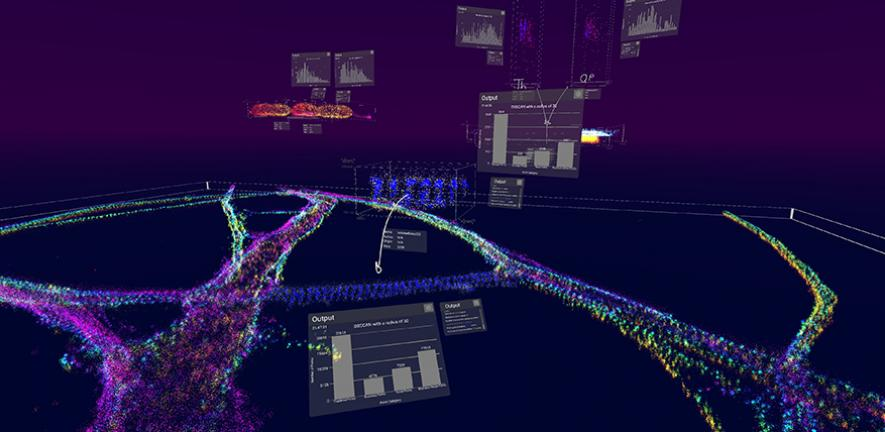Oct 13 2020
A new virtual reality software, called vLUME, enables scientists to “walk” inside and inspect individual cells. Scientists could use this software to interpret the underlying problems in biology and design new treatments for various diseases.
 DBScan analysis being performed on a mature neuron in a typical vLUME workspace. Image Credit: Alexandre Kitching.
DBScan analysis being performed on a mature neuron in a typical vLUME workspace. Image Credit: Alexandre Kitching.
The latest software was developed by a group of scientists from the University of Cambridge and Lume VR Ltd.—a 3D image analysis software company. Through this software, investigators can observe and analyze super-resolution microscopy data in virtual reality and can use it to examine everything from entire cells to individual proteins. Details of the study have been published in the Nature Methods journal.
Super-resolution microscopy received the Nobel Prize for Chemistry in 2014. Scientists can use this technique to acquire nanoscale images by using ingenious tricks of physics to overcome the limitations imposed by light diffraction. This approach has enabled them to view molecular processes as they occur. However, there were no suitable ways to observe and examine this data in three dimensions, which posed a major problem.
Biology occurs in 3D, but up until now it has been difficult to interact with the data on a 2D computer screen in an intuitive and immersive way. It wasn’t until we started seeing our data in virtual reality that everything clicked into place.
Dr Steven F. Lee, Study Lead, Department of Chemistry, University of Cambridge
The vLUME project was initiated when Lee and his team met with the founders of Lume VR at a public engagement event held at the Science Museum in London.
Although Lee’s team had the required know-how in super-resolution microscopy, the researchers from Lume were experts in data analysis and spatial computing, and together they succeeded in developing the vLUME into a robust new tool for studying complex datasets in virtual reality.
vLUME is revolutionary imaging software that brings humans into the nanoscale. It allows scientists to visualise, question and interact with 3D biological data, in real time all within a virtual reality environment, to find answers to biological questions faster. It’s a new tool for new discoveries.
Alexandre Kitching, CEO, Lume VR Ltd.
Observing the data in this manner can encourage new ideas and initiatives. For instance, Anoushka Handa—a Ph.D. student from Lee’s team—applied the new software to image an immune cell collected from her own blood, and later stood within her own cell in virtual reality.
“It’s incredible—it gives you an entirely different perspective on your work,” Alexandre added.
The novel software allows scientists to load in numerous datasets containing millions of data points and detect patterns in the complex data through integrated clustering algorithms. Such findings can be subsequently shared with global collaborators using video and image features in the software.
Data generated from super-resolution microscopy is extremely complex. For scientists, running analysis on this data can be very time-consuming. With vLUME, we have managed to vastly reduce that wait time allowing for more rapid testing and analysis.
Alexandre Kitching, CEO, Lume VR Ltd.
The researchers are mostly using the vLUME software with biological datasets, like cancer cells, immune cells, or neurons. For instance, Lee’s team has been analyzing how an immune response in the body is triggered by antigen cells.
“Through segmenting and viewing the data in vLUME, we’ve quickly been able to rule out certain hypotheses and propose new ones. This software allows researchers to explore, analyze, segment, and share their data in new ways. All you need is a VR headset,” concluded Lee.
Journal Reference:
Spark, A., et al. (2020) vLUME: 3D virtual reality for single-molecule localization microscopy. Nature Methods. doi.org/10.1038/s41592-020-0962-1.